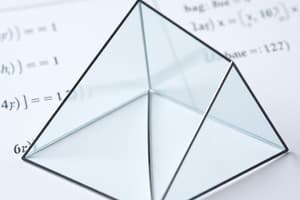Podcast
Questions and Answers
What is a point?
What is a point?
- A piece of a line with two endpoints
- A location that has neither shape nor size (correct)
- A location that has shape and size
- A flat surface made up of points
What is a line?
What is a line?
Made up of points and has no thickness or width
What is a plane?
What is a plane?
A flat surface made up of points that extends infinitely in all directions.
What are collinear points?
What are collinear points?
What are non-collinear points?
What are non-collinear points?
What are coplanar points?
What are coplanar points?
What are non-coplanar points?
What are non-coplanar points?
What is a line segment?
What is a line segment?
What are congruent segments?
What are congruent segments?
What is an angle?
What is an angle?
What are congruent angles?
What are congruent angles?
What is an angle bisector?
What is an angle bisector?
What is a right angle?
What is a right angle?
What is an acute angle?
What is an acute angle?
What is an obtuse angle?
What is an obtuse angle?
What are adjacent angles?
What are adjacent angles?
What is a linear pair?
What is a linear pair?
What are vertical angles?
What are vertical angles?
What are complementary angles?
What are complementary angles?
What are supplementary angles?
What are supplementary angles?
What are perpendicular lines?
What are perpendicular lines?
What is a polygon?
What is a polygon?
What is a regular polygon?
What is a regular polygon?
What is perimeter?
What is perimeter?
What is a triangle?
What is a triangle?
What is a quadrilateral?
What is a quadrilateral?
What is a pentagon?
What is a pentagon?
What is a hexagon?
What is a hexagon?
What is a heptagon?
What is a heptagon?
What is an octagon?
What is an octagon?
What is a nonagon?
What is a nonagon?
What is a decagon?
What is a decagon?
What is a hendecagon?
What is a hendecagon?
What is a dodecagon?
What is a dodecagon?
What is an n-gon?
What is an n-gon?
Flashcards are hidden until you start studying
Study Notes
Basic Geometry Concepts
- A Point represents a specific location without any dimensions.
- A Line consists of infinitely many points, extending without width or thickness.
- A Plane is an infinitely extending flat surface composed of points.
Relationships Among Points
- Collinear Points can exist on a single line.
- Non-collinear Points do not share the same line.
- Coplanar Points are contained within the same plane.
- Non-coplanar Points lie in different planes.
Line Segments and Measurements
- A Line Segment has two distinct endpoints.
- Congruent Segments are segments that have equal lengths.
Formulas
- The Distance Formula can be used to calculate the length between two points.
- The Midpoint Formula finds the middle point between two endpoints.
Angles and Their Properties
- An Angle forms when two rays meet at a common endpoint.
- Congruent Angles share the same measurement.
- An Angle Bisector divides an angle into two equal parts.
- Right Angles measure exactly 90 degrees.
- Acute Angles measure less than 90 degrees.
- Obtuse Angles measure more than 90 degrees.
Angle Relationships
- Adjacent Angles share a vertex and a side, residing in the same plane.
- A Linear Pair consists of two adjacent angles whose non-common sides create a straight line.
- Vertical Angles are formed by intersecting lines and are not adjacent.
- Complementary Angles have a sum of 90 degrees.
- Supplementary Angles total 180 degrees.
Lines and Polygons
- Perpendicular Lines intersect to create four right angles.
- A Polygon is a closed figure made with a finite number of straight line segments, called sides.
- A Regular Polygon has all sides and angles equal.
Area and Perimeter
- Perimeter refers to the total distance around a polygon.
- Area formulas for shapes include:
- Triangle Area calculation involves both the base and height.
- Rectangle Area is found through length times width.
- Circle Area calculation uses π times the square of the radius.
- Circumference of a Circle relates to two times π times the radius.
Types of Polygons
- Triangle: 3 sides
- Quadrilateral: 4 sides
- Pentagon: 5 sides
- Hexagon: 6 sides
- Heptagon: 7 sides
- Octagon: 8 sides
- Nonagon: 9 sides
- Decagon: 10 sides
- Hendecagon: 11 sides
- Dodecagon: 12 sides
- An n-gon describes a polygon with 'n' sides.
Studying That Suits You
Use AI to generate personalized quizzes and flashcards to suit your learning preferences.




